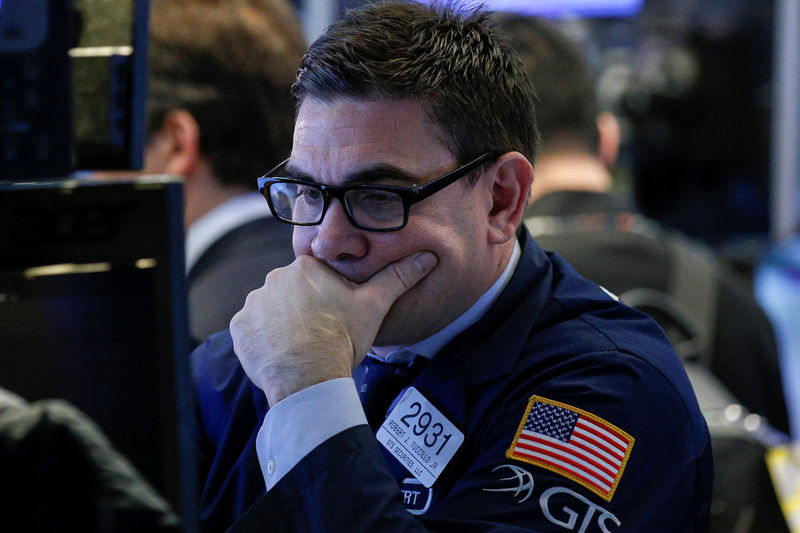Investing.com - Wall Street pressed lower on Monday as concerns over the economic outlook outweighed positive market developments and risk aversion dominated.
The fact that the spread on U.S. bond yields relaxed their inversion on Monday, after inverting for the first time since prior to the financial crisis, positive economic data out of Germany and relief over political developments stateside were unable to prevent an extension of the panic that triggered the S&P 500’s worst day since January at the end of last week.
At 10:00 AM ET (14:00 GMT), the Dow Jones fell 98 points, or 0.4% to 25,404.49 points, the S&P 500 lost 11 points, or 0.4%, to 2,789.72 while the Nasdaq Composite traded down 41 points, or 0.5%, to 7,601.81 points.
Investors were still jittery after the U.S. yield curve inverted on Friday for the first time since 2007. The yield on the 10-year Treasury fell below the 3-month T-bill rate, an event that some analysts consider to foreshadow a recession, though that is not always the case. In normal conditions, a longer-term bond should carry a higher yield than a short-term one as there is a higher risk for a longer time period.
However, Rob Carnell, economist at ING, warned against reaching too quick a conclusion.
“We suspect that drawing a recession conclusion from such data is not warranted until the 3M-10Y yield curve is inverted by a substantial amount,” Carnell said. “Just inverted ... doesn't do it for me.”
Chicago Federal Reserve Bank President Charles Evans also downplayed the yield curve inversion, given his confidence in the U.S. economic outlook.
“Some of this is structural, having to do with lower trend growth, lower real interest rates,” he said Monday at the Credit Suisse Asian Investment Conference in Hong Kong. “I think, in that environment, it's probably more natural that yield curves are somewhat flatter than they have been historically.”
Former Fed Chairwoman Janet Yellen also said on Monday that the yield curve may signal the need to cut interest rates at some point, but it does not signal a recession.
But risk-averse investors found little consolation in the fact that the yield curve returned to its normal shape on Monday, with the rate on the 3-month Treasury bill moving back below that of the benchmark 10-year note.
In a day with no major U.S. economic reports, German data had provided positive signs as business confidence in the euro zone’s largest economy rebounded more than expected, posting its first improvement after six months of declines.
Also reducing tensions, Special Counsel Robert Mueller found no evidence of collusion between U.S. President Donald Trump's campaign team and Russia, and did not present enough evidence to warrant charging the president with obstruction of justice, U.S. Attorney General William Barr said on Sunday.
The end to the investigation that Trump always referred to as a “witch hunt” not only could serve as a potential tool for his reelection campaign, but removes what some see as a distraction from pressing economic questions such as infrastructure spending or trade relations with China.
“Now is the time to get back on the offense on the economy and growth,” said Republican strategist Scott Reed.
In company news, Apple (NASDAQ:AAPL) is scheduled for a presentation at 1:00 PM ET (17:00 GMT) that is expected to lift the curtain on Monday on a secretive, years-long effort to build a television and movie offering.
Shares in Viacom (NASDAQ:VIAB) soared 7.6% after the company announced that it had renewed its contract with AT&T (NYSE:T), avoiding a blackout of MTV, Nickelodeon and Comedy Central for DirecTV users.
Outside of bonds and equities, the U.S. dollar index, which measures the greenback against six rival currencies, dropped 0.1% to 96.02 by 10:02 AM ET (14:02 GMT).
In commodities, gold futures rose 0.6% to $1,326.15 a troy ounce, while crude oil traded down 1.0% at $58.47 a barrel.
-- Reuters contributed to this report.
